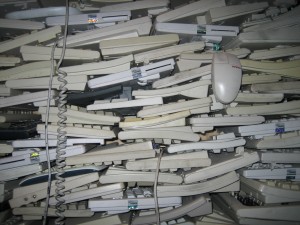Unit Three Prompt: Materialism and Media Artifacts
The readings from this unit ask us to consider the ways in which “media,” whether understood as a technological objects or as tools for sharing information and representations, are implicated in the material world. This involves theorizations of materialism that, following the concepts introduced by Miller, Maxwell, Barker and Gabrys, raise questions about the relationship between communication theory and labour as well as communication theory and the environment. The articles all draw our attention to the difference between our ‘common sense’ ways of thinking about media and how they are situatedas material objects in world in which we live (i.e. not just the messages they transmit, but also the way in which we internalize the chemicals of the devices we use.)

Pile of discharged computer keyboards. (Photo by Zinneke.)
A topic like this can often seem overwhelming, if not absolutely despairing. In the conclusion to her book Digital Rubbish: A Natural History of Electronics, Jennifer Gabrys explains that the way we think, produce and work with ‘waste’ can be a ‘terrain of ethics’ that suggest a different way for humans to relate to the material world. Using an example of how media and communication technology that might otherwise be viewed as destined to become ‘waste’ has been reclaimed and reconfigured for different uses, what kind of alternative ethics of media are possible? How does the alternative ethics you find in your example differ from the ‘common sense’ ethics that presumes media and communication technology are disposable?
Comments are closed, but trackbacks and pingbacks are open.